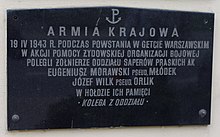Eugeniusz Morawski-Dąbrowa

Eugeniusz Morawski-Dąbrowa (born November 2, 1876 in Warsaw , Russian Empire , † October 23, 1948 ibid) was a Polish composer .
Life
Morawski studied piano with Antoni Sygietyński and composition with Zygmunt Noskowski at the Warsaw Music Institute from 1899 to 1904 . He also studied visual arts with Jan Kauzik , Konrad Krzyżanowski , Ferdynand Ruszczyc and Karol Tichy .
For his activity in the revolutionary faction of the Polish Socialist Party , he was arrested and sentenced by the tsarist military court to four years' exile in Siberia. At the intervention of his father, he was instead allowed to emigrate to France.
In Paris he studied with André Gédalge and Camille Chevillard and continued his training as a painter with Antoine Bourdelle . In re-established Poland, he became rector of the Poznan Music Academy in 1930 and then headed the Warsaw Conservatory (the renamed Music Institute) from 1932 to 1939 after Karol Szymanowski's departure .
During the Second World War he taught underground at a conservatory under the direction of Stanisław Kazuro . From 1944 he lived as a music teacher in Ruda Pabianicka , Łódź . In 1947 he returned to Warsaw.
Morawski-Dąbrowa composed, among other things, five operas and several ballets, three symphonies and six symphonic poems, two piano concertos and a violin concerto, seven string quartets, eight piano and two violin sonatas, four ballets, two plays and songs.
After his death in 1948 he was quickly forgotten until Monika Wolinska recorded three of his symphonic poems ( Don Kichot , Ulalume , Nevermore ) with the Warsaw Symphony Orchestra in 2013 and published them on CD.
Works
- Trio in A major for piano, violin and cello, 1900
- Prelude in C major for piano, 1902
- Msza częstochowska for choir and orchestra, 1902
- Kordecki , cantata for choir and orchestra, 1904
- Symfonia nr 1 'Vae Victis' in B minor, 1906
- Symfonia nr 2 'Fleurs du mal' in G minor, 1906
- Un grand sommeil noir , song based on Paul Verlaine , 1907
- Don Kichot , symphonic poem, 1909
- Par des nuits d'insomnie , song based on Leopold Staff , 1910
- La détresse , song based on Leopold Staff, 1910
- A ci co gina w boju , song based on Maria Konopnicka , 1911
- Never! Nie jestesmy niema lutnia , song based on Maria Konopnicka, 1911
- Magnolia , song based on Lucien Rolmer , 1911
- Nevermore , symphonic poem, 1911
- Open the door to me, oh! , Song after Robert Burns , 1912
- L'aube , song based on Catulle Mendès , around 1914
- Libera me Domine for voice, viola and organ, 1914
- Chanson , song based on Alfred de Musset , around 1918
- The midnight , song based on Heinrich Heine , 1920
- Agnus Dei for voice, violin and organ, 1920
- Milosc , ballet, 1928
- Krak i smok , ballet, 1929
- Switezianka , ballet, 1930
- For the time , song after Romain Rolland , 1940
- You're like a flower , song based on Heinrich Heine, 1945
- Symfonia nr 3 'Prometeusz' in E minor for soloists, choir and orchestra
- Ulalume , symphonic poem
- Hop-Frog , symphonic poem
- Irydion , symphonic poem
- Ahasweries , symphonic poetry
- Sonata in F sharp minor for piano four hands
- O vos omnes for voice and organ
- Baska komedia , oratorio
- Las placzacych brzóz , song based on Tadeusz Miciński
- Aspazja , opera (libretto after Aleksander Świętochowski )
- Lilla Weneda , opera (libretto after Juliusz Słowacki )
- Salammbô , opera (libretto after Gustave Flaubert )
- Pan Tadeusz , opera (libretto based on Adam Mickiewicz )
- Dafnis i Chloe , opera, unfinished
- Balet gotycki
- Kuszenie sw. Antoniego , ballet
swell
- Eugeniusz Morawski-Dąbrowa at the Polish Music Information Center (Polskie Centrum Informacji Muzycznej; Polish)
- Eugeniusz Morawski-Dąbrowa on Culture.pl
- Alfred Baumgartner: Propylaea World of Music - The Composers - A lexicon in five volumes . Propylaen Verlag, Berlin 1989, ISBN 3-549-07830-7 , pp. 83/84, volume 4 .
| personal data | |
|---|---|
| SURNAME | Morawski-Dąbrowa, Eugeniusz |
| BRIEF DESCRIPTION | Polish composer |
| DATE OF BIRTH | November 2, 1876 |
| PLACE OF BIRTH | Warsaw |
| DATE OF DEATH | October 23, 1948 |
| Place of death | Warsaw |
